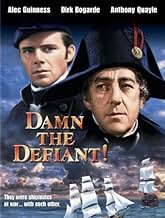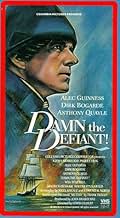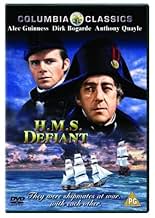Ajouter une intrigue dans votre langueOn the H.M.S. Defiant, during the French Revolutionary War, fair Captain Crawford is locked in a battle of wills against his cruel second-in-command Lieutenant Scott-Padget, whose heavy-hand... Tout lireOn the H.M.S. Defiant, during the French Revolutionary War, fair Captain Crawford is locked in a battle of wills against his cruel second-in-command Lieutenant Scott-Padget, whose heavy-handed command style pushes the crew to mutiny.On the H.M.S. Defiant, during the French Revolutionary War, fair Captain Crawford is locked in a battle of wills against his cruel second-in-command Lieutenant Scott-Padget, whose heavy-handed command style pushes the crew to mutiny.
- Réalisation
- Scénario
- Casting principal
Avis à la une
I think Alec Guinness is the only actor who can portray a character who is colorless yet also make him sympathetic. Perhaps the World War II era (with its emphasis on teamwork, its glorification of the average G.I., and its near-worship of able, but dull, leaders like Omar Bradley) may have influenced it, because the movie strongly emphasizes the worth of the common man, especially as personified by Anthony Quayle's character.
It's an offbeat movie: part sea adventure, part character drama, part historical epic. Critics might say it's not satisfactory in any of these areas, but those of us who love it recognize how special and even unique it is. Now that Columbia has finally released on DVD a letter-boxed version one can fully appreciate its worth, not only for the sea battle scenes, but also the many two-shots of Guinness and Bogarde interacting (or, more often, snarling) at each other.
Dramatic film with impressive battle of wills between humane Captain Crawford in command of the warship HMS Defiant perfectly performed by Alec Guinness against his first officer, the sadistic and supercilious first lieutenant , splendidly interpreted by Dick Bogarde . Authenticity is the hallmark of this breathtaking adventure along with awesome acting , spectacular warships and overwhelming sea battles . Production design , gowns and ambient show great attention to period detail . The support cast performances by all concerned are superb as Maurice Denham as Mr. Goss , Nigel Stock as Senior Midshipman Kilpatrick , Richard Carpenter as Lieutenant Ponsonby ,Peter Gill as Lieutenant D'Arblay ,David Robinson as Midshipman Harvey Crawford , Robin Stewart as Midshipman Pardoe , Ray Brooks as Hayes , and specially Anthony Quayle as Vizard . Very good cinematography in Cinemascope by Christopher Challis and evocative score by Clifton Parker . The motion picture was well directed by Lewis Gilbert .
The flick was inspired on actual events as ¨The mutiny at Spithead¨ in 1797. Sailors on 16 ships in the Channel Fleet, commanded by Admiral Lord Bridport, protested against the living conditions aboard Royal Navy vessels and demanded a pay raise. Seamen's pay rates had been established in 1658, and because of the stability of wages and prices, they were still reasonable as recently as the 1756–1763 Seven Years' War . The Royal Navy had not made adjustments for any of these changes, and was slow to understand their effects on its crews. Finally, the new wartime quota system meant that crews had many landsmen from inshore, who did not mix well with the career seamen , leading to discontented ships' companies. The mutineers were led by elected delegates and tried to negotiate with the Admiralty for two weeks, focusing their demands on better pay , and the removal of a handful of unpopular officers; neither flogging nor impressment was mentioned in the mutineers' demands. The mutineers maintained regular naval routine and discipline aboard their ships , allowed some ships to leave for convoy escort duty or patrols, and promised to suspend the mutiny and go to sea immediately if French ships were spotted heading for English shores.Because of mistrust, especially over pardons for the mutineers, the negotiations broke down, and minor incidents broke out, with several unpopular officers sent to shore and others treated with signs of deliberate disrespect. When the situation calmed, Admiral Lord Howe intervened to negotiate an agreement that saw a Royal pardon for all crews, reassignment of some of the unpopular officers and a pay raise . Afterward, the mutiny was to become nicknamed "breeze at Spithead".
The mutiny on the Bounty is the one that most people think of whenever they hear the word "mutiny". Otherwise they think of THE CAINE MUTINY. Actually there have been many mutinies. In 1905 a mutiny on the Russian battleship Potemkin occurred at Odessa on the Black Sea. It was immortalized by Serge Eisenstein in his film of the name POTEMKIN.
It surprises many people outside of England that the Bounty was peanuts compared to the Great Mutiny of 1797 at the Nore and Spithead of the entire British fleet (also the 1931 Invergordon Mutiny of the British fleet during the depression, which was a total surprise). The Great Mutiny is supreme because it occurred just when England was facing revolutionary France in the French Revolutionary Wars. A force being planned by Wolfe Tone and the French General Lazare Hoche was to invade Ireland. By sheer chance the French were unable to take advantage of the moment of England's peril to invade.
The 1797 Mutiny at Spithead was actually successful - various gains in pay and food were made by the sailors. Then came the Nore Mutiny, which was led by a seaman of some leadership qualities named Richard Parker. Parker's demands were impossible, and he apparently toyed with leading the fleet to France. Instead the British Admiralty got tough, and crushed the mutiny. Ironically one of the last ships to give up was H.M.S. Director, which was commanded by William Bligh. It was the second mutiny (of three!) that Bligh would face in his career. Parker was tried for mutiny and executed, as were dozens of other sailors.
It would be nice if some enterprising producer would make an accurate film of the 1797 Mutiny - but until that day comes we are left with two films that roughly approximate the story. There is Peter Ustinov's BILLY BUDD, which is set in the period of the Great Mutiny, and this one. BILLY BUDD has much going for it regarding it's source material (Herman Melville's brilliant study of good and evil, and how they are impossible to separate). Then there is DAMN THE DEFIANT / H.M.S. DEFIANT, which tells the story from the point of view of a single vessel and the evils that permeated all the crew from the Captain to the tars.
Alec Guinness is a well meaning but weak leader who is the Captain of Defiant, and has been stuck with Dirk Bogarde as his new second in command, a socially well-connected sadist. Bogarde is determined to be the real commander of the ship, and is willing to do what is needed to bring Guinness and everyone in sight under heal. Guinness's son is a midshipman on the DEFIANT, and Bogarde keeps finding ways of punishing the young man that Guinness (because of fears of favoritism) will not interfere with. On top of this, during one battle, Guinness loses an arm (a salute to Lord Nelson who was similarly was crippled).
However, the men led by Anthony Quayle, decide to join the mutiny. And then it is Bogarde's turn to sweat.
What were the gripes of the mutineers? Low pay (the government spent money on bribes for votes, but not decent pay). Nothing like pensions for the men - frequently kidnapped by press gangs in the major cities - and left cripples after serving in the naval battles. Food was crap - the quartermasters and the people who sold supplies were in cahoots and sold rotten food to the ships. It was a "lovely life". The wonder is that there weren't more bloodbath mutinies. One (in 1798) on board H.M.S. Hermoine led to the murder of a dozen officers, including the Captain (one Hugh Pigott). Reading of it makes one realize how lucky Bligh and the Admirals were that they did not face the real wrath that was just under the surface.
The Defiant sets sail from the naval harbor at Spithead just before the ships of the Channel Fleet are ready to start an organized mutiny. So with no contact between them and the ships at Spithead or in the Mediterranean, the men of the Defiant have to work out their own course of action. That action is the basis for what happens.
They've got an unwitting ally in the ship's executive officer, Scott- Padget played by Dirk Bogarde. A future Drake or Hawkins with influence and a taste for sadism. He looks to usurp the authority of Captain Crawford who is played by Alec Guinness. The conflict between them plays into the hands of the mutineers.
In that other famous story of the sea, Mutiny on the Bounty, Fletcher Christian points out to Captain Bligh that the men drafted into the Royal Navy from the press gangs aren't king and country volunteers. Neither are these people in the foc'sle of the Defiant.
Bogarde plays against type and does it well. He's usually not a villain in film although he had essayed villainous roles before in his career. But Guinness is a wonder. His Captain Crawford, calm, detached, and inspiring in his own way in his patriotism was a role Alec Guinness could be proud of. Totally different than the characters he played in those Ealing studio comedies. This falls more in line with Colonel Nicholson in The Bridge on the River Kwai or Colonel Sinclair in Tunes of Glory without the bad character features the other two had.
Great Britain eventually stopped using press gangs, but at the time it was the way the Royal Navy got a crew together. In fact later on during the Napoleonic Wars, the British took to stopping American ships and impressing members of those crews in the Royal Navy. It was one of the causes of the War of 1812.
Two other performances in H.M.S. Defiant are worthy of note. Anthony Quayle as the mutiny leader on the Defiant and Tom Bell one of the mutineers whose rashness nearly blows it all for the seamen and their cause.
Hovering over all of this is the French and to me the highlight of the film is Alec Guinness reminding the men of their duty to prevent a French invasion of their island home. It's a superb piece of drama.
A little Mutiny on the Bounty, a little Horatio Hornblower go into the plot of H.M.S. Defiant. It's a good mix with a superb group of players serving it up for the audience.
Le saviez-vous
- AnecdotesSir Alec Guinness and Sir Anthony Quayle made this movie during the two-month break in the shooting of Lawrence d'Arabie (1962), when the production moved from Jordan to Spain. Upon finishing this movie, both returned to Lawrence of Arabia (1962).
- GaffesIn the last scene, Sir Alec Guinness orders all larboard (port side) guns to bear on the fire ship. In the next shot, the starboard cannon fire. Ironically, the term "larboard" was changed by the navy into the current term "port" precisely because it was too easy to mistake it for starboard.
- Citations
Lieut. Scott-Padget: [Scott-Padget turns back to the Captain as he begins to exit] You may have the power of life and death over every man about this ship, sir, but I warn you: if we come through this voyage safely...
Captain Crawford: [Crawford looks up from his work] Yes? If?
Lieut. Scott-Padget: To have followed Admiralty instructions may not be quite be enough.
Captain Crawford: [Crawford smacks his desk, jumps up and approaches Scott-Padget] I will say this to you only once, sir: I will not be bullied or threatened and I intend to be obeyed! Your friends in London mean nothing to me! I assure you that while you serve aboard this ship, they will mean absolutely nothing to you! You can go now.
- Crédits fousOpening credits prologue: SPITHEAD, ENGLAND 1797
- ConnexionsFeatured in Bequest to the Nation (1973)
Meilleurs choix
- How long is Damn the Defiant!?Alimenté par Alexa
Détails
- Date de sortie
- Pays d’origine
- Langues
- Aussi connu sous le nom de
- Damn the Defiant!
- Lieux de tournage
- Denia, Alicante, Comunidad Valenciana, Espagne(Spanish coast)
- Sociétés de production
- Voir plus de crédits d'entreprise sur IMDbPro
- Durée1 heure 41 minutes
- Couleur
- Rapport de forme
- 2.35 : 1
Contribuer à cette page



































